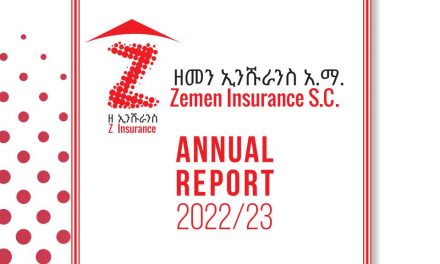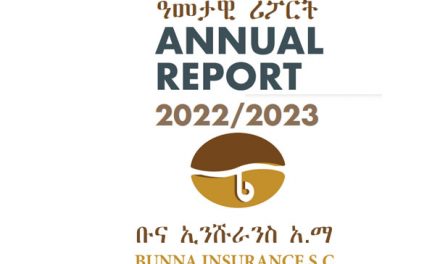The month of November 2022 will live on in the memories of those who work in the insurance sector. Their painstaking labor finally paid off this month. The central bank granted the insurance managers’ long-standing request to implement a minimum insurance premium. It became effective this week.
While the first minimum insurance policies since last year were for policies like bond and engineering, this time around the emphasis is on coverages for automobiles.
The introduction of the minimum premium rate for motor insurance policies, which offer coverage to the insured vehicles against any losses due to an accident or those resulting from other damages, is reflected in the words of Gudina Legesse, CEO of Awash Insurance, the leading private insurer in Ethiopia, with a gross written premium of over 1.2 billion birr last year.
“It came at the right time,” he said.
Sessen Yilma, an expert with almost a decade of experience, concurs.
“It would reverse the self-destructive rate-based competition in the insurance industry and encourage the companies to focus on improving service efficiency, especially in their claims services,” Sessen said, warning that the only hurdle in implementation is enforcing uniformity across the industry.
The insurance sector is one of Ethiopia’s undeveloped economic sectors, making up less than one percent of the nation’s GDP with 15 billion birr in annual gross written premiums for all insurance companies. While the regulatory body is also responsible for the sector’s unsatisfactory growth over the past 10 years because of its overemphasis primarily on the banking business, players in the insurance industry are also to blame.
It is not uncommon to see insurance companies reduce their prices below what is appropriate in order to attract new clients. Insurance companies frequently compete on pricing rather than offering new products, which is considered unethical by other competitors in the market.
The same justification is offered by insurance company managers whenever shareholders inquire as to why profit is not increasing as it should.
Endrias Tadesse is an insurance expert with 12 decades of work experience. He is one of those who have observed the players in the industry engaged in what appears to be a price war.
“The industry was paying more than what it gets in the form of premiums due to the unjust pricing set by insurance businesses,” said Endrias, adding that the new rate will bring healthy competition to the market.
Zamra Actuaries, a Kenyan firm, has prepared the minimum rate for the motor class of business. It used the premium and claim data provided by insurance companies and their financial statements for the work.
By doing so, it put the minimum rate between 1.5 percent and four percent, depending on the type of vehicle. The highest minimum rate is set for vehicles providing public service, whereas the lowest is for private vehicles, excluding motor cycle.
The new rate received a mixed reaction among customers. Nebiyou Emmanuel is among those who renewed their insurance policies last week. He believes the new rate is fair, as long as it helps insurers settle claims on time.
“It is for the sake of everyone. Insurers can only pay claims if they are charging the right rate,” said Nebiyou, who bought full insurance coverage for his Suzuki Swift 2022 for 40,000 birr, twice what he paid last year.
Another customer, who is renewing his policy for the Suzuki Dzire 2021, disagrees. “Doubling the price discourages customers from buying the policy. The adjustment was supposed to be gradual,” said the customer, who is now reconsidering his decision to renew the policy that is about to expire within a week.
For Sessen, the reaction coming from customers has been to simply pay for third-party insurance and assume the risk of damage to their own vehicles, which is unwise given the market’s rising prices for spare parts for all types of vehicles.
“I believe that the customers will realize in time that the discounted premium rates they have enjoyed in contrast to the ever-increasing cost of living in the Ethiopian economy have come to an end,” Sessen said.
Sessen believes that this is not an entirely bad thing for the customers if it leads to an improved claims service from the insurers, as they now probably have an incentive to compete among each other in terms of efficiency in service delivery.
Players in the industry anticipate that the new rate will remain for years to come. “All policies require a minimum rate, and the new rate for motor will be adjusted based on a study by an actuary,” said Gudina, emphasizing that the new rate takes effect based on an assessment made three years ago.
TheReporterEthiopia






 US Dollar(USD)
US Dollar(USD) Euro(EUR)
Euro(EUR) Pound Sterling(GBP)
Pound Sterling(GBP) UAE Dirham(AED)
UAE Dirham(AED) Saudi Riyal(SAR)
Saudi Riyal(SAR)

